Author: Alyssa (Aly) Brewer
Location: NaDEET, Namibia
Pronouns: She/Her/Hers
Namibia is a dry nation. Most if its rainwater evaporates before it reaches the ground. Wet clothes are ready to wear in an hour’s time. Lotion is a must. Chapstick your new best friend. That being said, water conservation is of the upmost importance. While living in this sunset-colored country, I have learned a few tricks or two on how to live “green.”
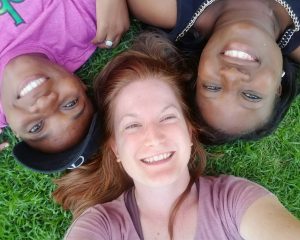
(Right to left Support Staff and wonderful friend Donna, me, Professor of History Albertina).
Casually, us twelve students hopped into the van for another 6-hour drive to another location- this time the Namib desert. We have become pros by now at handling long road trips. Once we arrived, there was sand, sand everywhere. For the remainder of the weekend we would find sand in a million and one places. I am still emptying out sand from pockets and backpacks. But oh, did that sand become so beautiful at sunrise and sunset. We would run it through our fingers and watch the rays illuminate it as it trickled down. Living in the desert posed its challenges, but it all became worth it at nighttime. Each sunset, we would climb the nearest dune and stare endlessly at the horizon.
Then, we would stay there waiting for the stars to appear. Orion, the Southern Cross, then Scorpio. Sometimes we made up our own constellations and told our own stories. It felt so natural to be immersed in the world around us. And yes, we took lots of pictures.
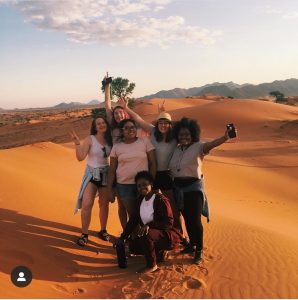
While watching sunsets and counting stars were great aspects of the trip to the Namib desert, they were not the real reason we traveled there. We stayed in cabins run by NaDEET (Namib Desert Environmental Education Trust) a conservation revolving around water preservation and sustainability. Each day the staff there taught us a new way to reduce our waste and conserve what we have. First, we learned about light pollution. NaDEET lives in a Dark Sky District which means they need to cover their lights sources as to not pollute the night sky. For example, in my cabin, a tin can covered the lightbulb so the light only directed downwards where we needed it. Most lights, especially streetlamps, project light out not down which contributes to light pollution. Even though I live in a relatively small city in the states, I still have never seen the milk way or more than a few stars at night. I had no idea how much nighttime lights affect the sky- but now I have the knowledge to change my habits to reduce pollution and increase efficiency. 1. Cover lights. 2. Get LEDS- they last longer and use less energy. 3. Turn them off when not in use.
Another fun activity we did was make pizza- but in a solar cooker! A solar cooker works by concentrating the sun’s rays (which the desert has lots of) and trapping them to heat up the food like an oven would. It was a delicious and energy efficient experiment.
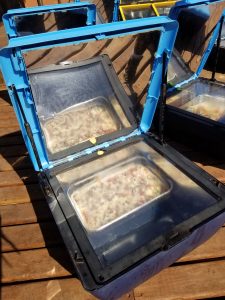
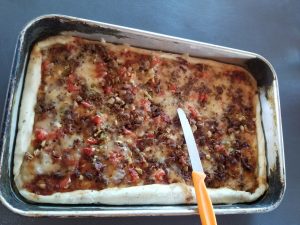
Might I add that my group’s pizza was the best.
But of all the activities and all the experiments, the most crucial was water conservation. Each cabin competed to use the least amount of water. Some people were joking about not showering for the whole time… No one wanted to sit next to those people. But in all honesty, this was one of my favorite parts. We learned how to use the shower-bucket method which reduces the use of water. The energy from the solar panels heated up the water in a tank, you collected it in one bucket, poured it into the shower bucket which had a valve that could release the water by gravity when needed. Instead of using gallons of water for 20 minutes, I used only a few and was still able to get clean. Also, the trip to get the water was a deterrent for using too much- maybe it was laziness of contentiousness- but either way it worked.
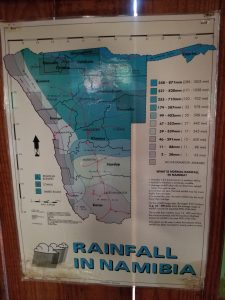
In a country that is mostly desert and receives little rainfall- especially this year during the worst drought in generations- I have learned how to conserve as much water as I can. So here are a few environmentally friendly tricks I’ve learned along the way.
- Turn down the temp of your water heater. Often it is too hot anyway, so you must go back and forth between the cold and warm knobs to get it right. This technique saves energy, water, and money!
- Compost. It reduces the amount of waste thrown in landfills.
- Take showers over bathes. They use less water. Keep them short and turn off the water in between lathering and shampooing.
- Fill up the sink with soap and water to wash dishes rather than letting the tap run.
- Reusable water bottles. This reduces the use and waste of plastic.
- Fix leaking faucet! A single drip for a year can waste over 2,000 gallons of water. That’s quite a bit of money down the drain too.
As I reflected upon my experience at NaDEET, I realized not only how beautiful the Namib desert is but also how important it is to conserve as much as you can. I am forever blessed for having this experience-it has opened my eyes to a whole new world.
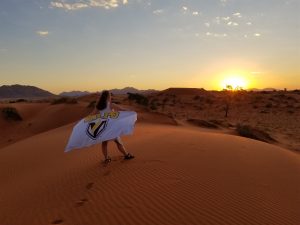
Leave a Reply